Select Language

By Lucia Mutikani
WASHINGTON (Reuters) -U.S. consumer confidence dropped by the most in three years in September amid mounting fears over the labor market, though more households planned to buy a home over the next six months.
The Conference Board survey on Tuesday also showed consumers expected inflation to increase in the coming year, clouding their views of the economy ahead of the Nov. 5 presidential election. The economy could determine the outcome of the vote.
Still, consumers remained interested in traveling and dining out as well as going out to movies. That could help to underpin consumer spending and the economic expansion.
The Federal Reserve last week cut interest rates by 50 basis points to the 4.75%-5.00% range, the first reduction in borrowing costs since 2020, which Fed Chair Jerome Powell said was meant to demonstrate policymakers' commitment to sustaining a low unemployment rate. The jobless rate is currently at 4.2%.
"The plunge in consumer confidence underscores the growing pressure on many households as the labor market weakens," said Ben Ayers, senior economist at Nationwide. "If the Fed follows through with a relatively aggressive easing cycle over the next year, that could shore up consumers' optimism in the state of the economy and keep the economy from a hard landing."
The Conference Board's consumer confidence index dropped to 98.7 this month from an upwardly revised 105.6 in August. The decline was the largest since August 2021. Economists polled by Reuters had forecast the index rising to 104.0 from the previously reported 103.3.
The cut-off date for the survey was Sept. 17, before the U.S. central bank kicked off its easing cycle.
The biggest drop in confidence was among the 35 to 54 years age group. Confidence fell across most income groups, with consumers earning less than $50,000 a year experiencing the biggest decrease. The Conference Board said write-in responses about politics, including the November elections, remained below both 2020 and 2016 levels.
"The deterioration across the index's main components likely reflected consumers' concerns about the labor market and reactions to fewer hours, slower payroll increases, fewer job openings, even if the labor market remains quite healthy, with low unemployment, few layoffs and elevated wages," said Dana Peterson, chief economist at the Conference Board.
Stocks on Wall Street inched higher. The dollar fell against a basket of currencies. U.S. Treasury yields rose.
BUYING PLANS MIXED
The share of consumers who viewed jobs as being "plentiful" dropped to 30.9%, the lowest since March 2021, from 32.7% in August. Some 18.3% of consumers said jobs were "hard to get," up from 16.8% last month.
The survey's so-called labor market differential, derived from data on respondents' views on whether jobs are plentiful or hard to get, fell to 12.6. That was the narrowest since March 2021 and was down from 15.9 in August.
This measure correlates to the unemployment rate in the Labor Department's monthly employment report.
Economists said at first blush the shrinking labor market differential would imply the jobless rate rising to 5%, but noted that monthly moves can be noisy.
"The persistent drop in this measure is a clear sign that the labor market is not nearly as tight as it once was," said Shannon Grein, an economist at Well Fargo. "That said, we're hesitant to put too much weight on this data given broader confidence measures have remained depressed this cycle despite resilient spending habits of households."
The unemployment rate slipped in August after rising for four straight months. It has increased from 3.4% in April 2023.
The rise in the unemployment rate has been driven by an increase in labor supply, mostly from immigration. Layoffs remain at historically low levels.
Consumers' assessments of their financial situation, both now and over the next six months weakened. Plans to buy big-ticket appliances were mixed, with a slight increase in the share of consumers intending to purchase motor vehicles, refrigerators and clothes dryers over the next six months.
But the share of those planning to buy television sets and washing machines declined. A new question about services in this month's survey showed strong intentions to spend on healthcare and utilities over the next six months.
Consumers' 12-month inflation expectations increased to 5.2% from 5.0% in August, though more mentioned lower inflation in their write-in responses.
"If inflation expectations continue to rise and the labor market continues to soften, the Fed is going to have a difficult time appropriately recalibrating monetary policy," said Conrad DeQuadros, a senior economic advisor at Brean Capital.
The Fed raised the policy rate by 525 basis points in 2022 and 2023. It is expected to lower borrowing costs again in November and December.
The share of consumers planning to buy a house over the next six months jumped to 5.7%, the highest level since August 2023, from 4.8% in August. That coincides with a decline in mortgage rates to more than 1-1/2-year lows as well as a moderation in house price inflation. Home price appreciation has cooled as a surge in mortgage rates during the spring pushed buyers to the sidelines, resulting in a rise in housing supply.
A separate report from the Federal Housing Finance Agency on Tuesday showed single-family house prices gained 0.1% on a month-on-month basis after being unchanged in June. They increased 4.5% in the 12 months through July, the smallest rise since June 2023, after advancing 5.3% in June.
"Lower mortgage rates should boost demand, however, preventing a significant softening in prices," said Nancy Vanden Houten, lead U.S. economist at Oxford Economics.

France's young finance minister PARIS (Reuters) -France's newly appointed finance minister, tasked with steering the nation out of a deep fiscal hole amid growing investor concern over debt, acknowledged on Tuesday concerns over his young age and lack of experience.
Antoine Armand, a 33-year-old ally of President Emmanuel Macron, was named France's new finance minister over the weekend. On Monday, the country's 10-year bond yield was just 1-1/2 basis points away from surpassing that of Spain's traditionally more risky paper for the first time since late 2007.
"I understand these questions," Armand told France Inter radio, adding: "When you've had government experience, you have a certain number of habits. When you haven't got that, yes it's new, yes it's quite a thing."
Teaming up with new Budget Minister Laurent Saint Martin, who is 39, Armand has the daunting task of plugging a huge hole in the budget. Previously little-known beyond Parisian political circles, the duo face pressure to figure out how to rein in France's budget deficit as it spirals towards 6% of GDP.
"We have one of the worst deficits in our history, so the situation is serious", Armand said. "Our hard work will match the seriousness of this situation."
Asked whether the country will meet its budget deficit projection this year, Armand declined to give a clear answer, saying he was working with the budget minister on a "credible" updated estimate to be presented soon.
France's chief auditor last week told lawmakers the finance ministry's current forecast of a deficit at 5.1% of GDP was out of reach due to reduced tax incomes amid an economic slowdown and lower public sector savings than needed.acknowledges scale of job as markets fret

By Makiko Yamazaki and Kentaro Sugiyama
TOKYO (Reuters) - At least two candidates vying to become Japan's next prime minister are planning to tackle one of the country's most sacred political cows: labour market reforms that would make it easier for businesses to hire and fire workers.
Shinjiro Koizumi, the 43-year-old son of former premier Junichiro Koizumi, and Taro Kono, who as digital minister is trying to promote more innovation, have both called for relaxing Japan's rigid labour rules.
Those rules have been a feature of Japan's "salary-man" corporate culture for decades, dating from when the country's post-war population was growing and its traditional labour model of lifetime employment was effective.
But rigid labour rules have been more recently blamed for blocking the movement of labour from mature sectors into growing ones where employees are needed in a tight labour market.
"The ongoing labour market reform is missing the crux of the issue, and that's the revision to dismissal rules," Koizumi said this month.
"An ultimate growth strategy is to create a system that fosters a labour shift to startups and small firms in growth sectors," said Koizumi, who pledged to submit a labour reform bill next year if elected party leader.
Kono specifically proposed establishing a monetary compensation framework for dismissed workers as a way to settle disputes, a step he said would allow more flexibility in the labour market.
Overhauling dismissal rules is politically sensitive in Japan, having been repeatedly pushed back with little progress made in the past.
International bodies such as the Organisation for Economic Cooperation and Development (OECD) have also long blamed the lack of employment flexibility for Japan's low labour productivity, low rates of new business entries and income gap between regular and non-regular staff.
On average, Japanese workers have been with their current employer for 12.3 years, compared to 4.1 years in the United States and 9.7 years in Germany. A Gallup poll found only 6% of Japanese workers engaged in their jobs compared to the 23% global average.
The statutory law on dismissal is vague, but judicial precedents have established four criteria that have to be met, raising the bar high for layoffs, experts say.
The rules, for example, require the company to prove that there is an economic need to decrease its workforce and all efforts have been made to avoid dismissals when firing employees.
"The biggest issue is that these rules are based on judicial precedents decades ago," said Kotaro Kurashige, a lawyer who specialises in labour issues.
Japan's Liberal Democratic Party, which has a parliamentary majority, will elect a new leader on Sept. 27, with the winner to replace outgoing Prime Minister Fumio Kishida. A record nine candidates are running in the race.
PUSH-BACK
As in the past, the policy pledges by Koizumi and Kono have sparked heavy backlash on social media and from labour unions, as well as from conservative lawmakers worried such changes could increase layoffs.
"I strongly object to any relaxation of rules that allow companies to freely fire workers," Tomoko Yoshino, the president of Japan's largest labour organisation Rengo, said in an emergency study session last week.
Some also doubt the validity of the argument that relaxed dismissal rules would help rejuvenate the economy.
"It may not be true that relaxed rules would promote a shift of labour to growth sectors and overall wage growth, as dismissed workers may end up with low-paying jobs," Takuya Hoshino, economist at Dai-ichi Life Research Institute, said.
The negative reactions have forced Koizumi to water down his pledge and shift his focus more to increasing support for workers to acquire skills and find new jobs, initiatives already launched by the Kishida administration.
Still, proponents say the opportunity for reform is now greater than in the past, as Japan exits years of deflation with companies delivering the biggest wage hikes in three decades this year and the jobless rate consistently below 3%.
Suntory Holdings CEO Takeshi Niinami, one of the leading voices of corporate Japan, welcomed the issue coming up during the ruling party leadership race.
"Those rules were created during the manufacturing-centred postwar economic boom and must be reviewed," said Niinami, who also serves as chair of the Keizai Doyukai business lobby.
It's good timing for such discussion as labour shortages and tougher competition for talent have begun to push up wages, he said. "I want new-generation leaders to discuss how to change all postwar frameworks without any taboo."
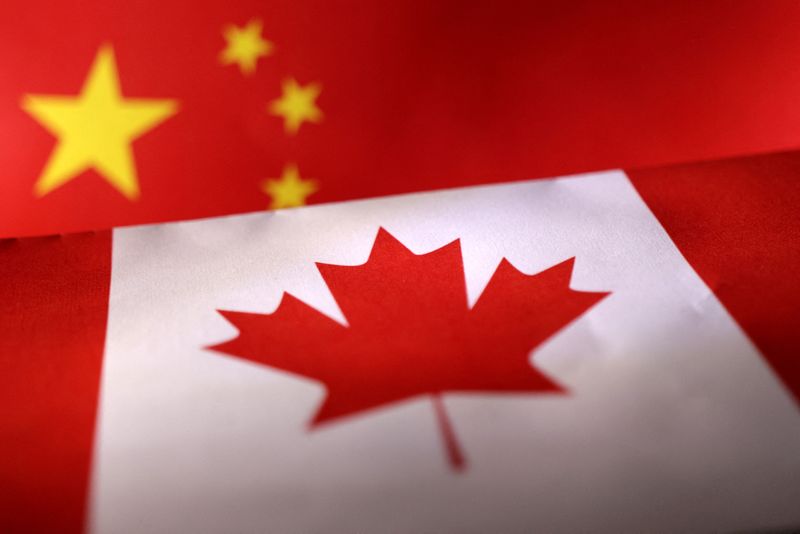
By Divya Rajagopal
TORONTO (Reuters) -The Canadian province of Saskatchewan has vowed to compete with China in processing and production of rare earths and become the first North American commercial alternative source for the metals, used to make magnets for electric vehicles and wind turbines.
The Saskatchewan Research Council Rare Earth Processing facility is betting on demand for these magnets to jump in the next couple of years, driven by demand from original equipment manufacturers such as automakers.
The Canadian province, home to copper, potash and uranium mines, is known for its mining prowess.
China controls 95% of the global production and supply of rare earth metals. The near-monopoly allows the country to dictate prices and create uncertainty for end users through export controls.
In the last year, China has placed export controls on some critical metals such as germanium, gallium and antimony, forcing western governments to look for alternatives.
The SRC Rare Earth processing facility has begun production on a commercial scale and expects to hit a production target of 40 tonnes of rare earth metals per month by the end of this year. And it will produce 400 tonnes of the NdPr metals per year, which is enough to produce 500,000 EVs, according to SRC. The facility has already tied up with potential clients in South Korea, Japan and the United States.
"Our focus is to remain competitive within the Asian Metals Price Index," said Muhammad Imran, vice president of the SRC Rare Earth Element. "We are constantly looking to optimise our facility using artificial intelligence applications that would keep our process efficient," Imran said.
The price of rare earth metals such as neodymium praseodymium, known as NdPr, fluctuates between US$65,000 and US$75,000 per tonne, a price determined by the Chinese government.
However, some miners have been asking for a premium price for metals produced outside China, arguing that Chinese metals are produced with low environmental, social and governance standards.
Regardless, Imran said, the market will remain competitive and manufacturers have to be prepared to meet the reference point of the Asian Metals Index.
"This is what the market is telling you the price for rare earth is, if someone can strike a better deal that's great, but premium or no premium the market is going to be competitive," he said.
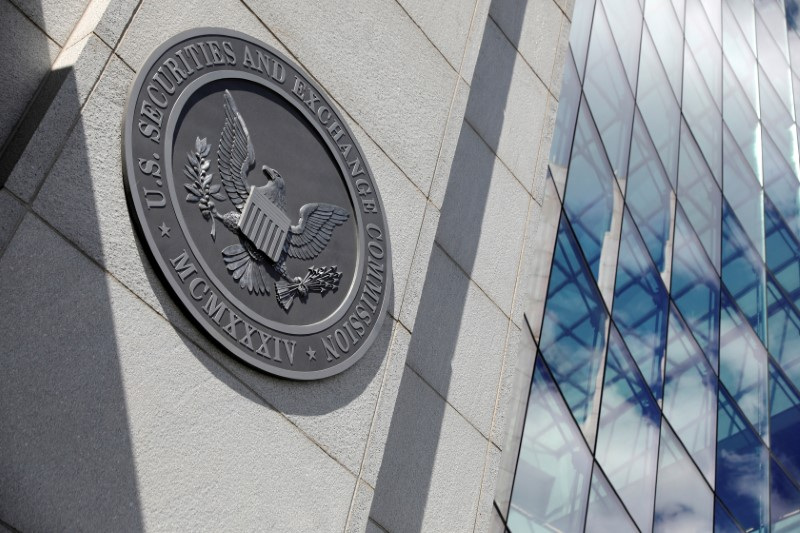
By Davide Barbuscia
NEW YORK (Reuters) - Liquidity in the $27 trillion U.S. Treasury market, the largest government bond market in the world, is back to levels seen before the Federal Reserve started hiking interest rates in 2022, according to a New York Fed report.
Liquidity - or the ability to trade an asset without significantly moving its price - worsened over the past few years as U.S. government bond prices swung sharply since the U.S. central bank started hiking rates to tame inflation.
But common measures to assess trading conditions "point to an improvement in Treasury market liquidity in 2024 to levels last seen before the start of the current monetary policy tightening cycle," Michael Fleming, head of Capital Markets Studies in the Federal Reserve Bank of New York’s Research and Statistics Group, said in a post on the New York Fed's Liberty Street Economics blog on Monday.
Fleming observed improvements in the bid-ask spread, which is the difference between the highest bid price and the lowest ask price for a security. Spreads have been narrow and stable since mid-2023, after widening in the aftermath of the U.S. regional banking turmoil in March last year, he said.
Order book depth, or the average quantity of securities available for sale or purchase at the best bid and offer prices, has also increased since March last year, he said, although it declined in early August this year when a weaker-than-expected jobs market report and a surprise rate hike by the Bank of Japan shook financial markets.
Finally, Fleming observed an improvement in the price impact of trades, which assesses the price change that occurs when a buyer or seller begins a trade. After rising sharply during the March 2023 banking turmoil, price impact has been declining to levels last seen in late 2021 and early 2022, he said, before rising again in early August 2024.
Regulators and the Treasury itself have in recent years launched a slate of reforms to improve trading conditions and avoid disruptions in the world's biggest bond market. Still, many market participants remain concerned that vulnerabilities that emerged in previous incidents, such as in March 2020 when liquidity rapidly deteriorated amid pandemic fears, could still reappear in case of spikes in volatility and as government debt supply continues to grow.
Recent improvements in liquidity have been accompanied by a decrease in volatility, or price fluctuations, said Fleming.
However, a proxy for Treasuries liquidity that measures deviations between certain Treasury yields has kept deteriorating, he added.
"The market’s capacity to smoothly handle large trading flows has been of ongoing concern since March 2020 ... debt outstanding continues to grow, and recent empirical work shows how constraints on intermediation capacity can worsen illiquidity," he said.
"Close monitoring of Treasury market liquidity, and continued efforts to improve the market’s resilience, remain appropriate."

BANGKOK (Reuters) - Thailand will postpone a hike in the minimum wage to 400 baht ($12.15) per day scheduled for October 1 by about two weeks due to a lack of a quorum at meetings of the committee working on the increase, a senior labour official said on Monday.
The committee, which includes representatives from employers, labour and the government, had failed to reach a quorum at two previous meetings to discuss the planned hike, Labour Ministry permanent secretary Pairoj Chotikasathien said.
"We will move forward as quickly as possible," he said, adding the new minimum wage would only apply to businesses that employed more than 200 people.
The increase in the minimum wage from the current range of 330 baht to 370 baht per day was part of the ruling Pheu Thai party's campaign platform, and it has pledged to increase it further to 600 baht by 2027.
The planned hike is part of the government's drive to spark growth in Southeast Asia's second-largest economy, which has been held back by soaring household debt and a slowing manufacturing sector.
The government's flagship policy is a 450 billion baht stimulus scheme, where people will be given 10,000 baht each to spend in local communities. The first phase is set to begin before the end of the month. The central bank expects the economy to grow 2.6% this year, up from 1.9% in 2023.
($1 = 32.92 baht)
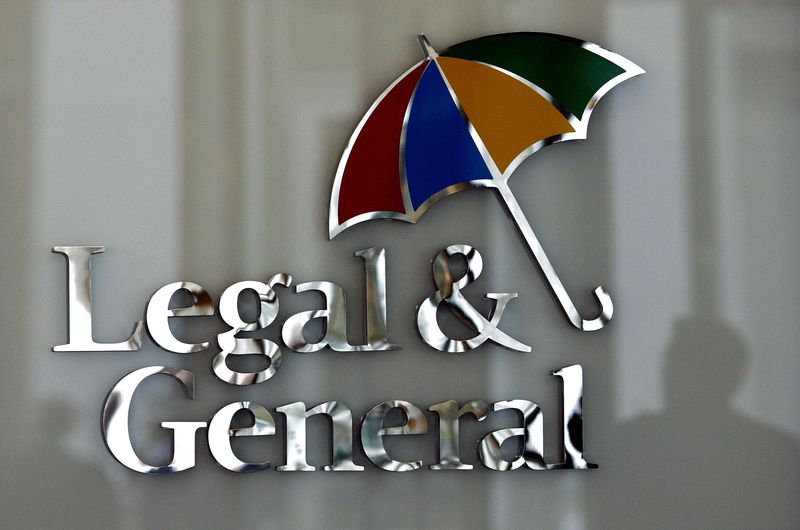
By Iain Withers and Sinead Cruise
LONDON (Reuters) - British investment managers Legal & General and Schroders (LON:SDR) are to invest hundreds of millions of dollars in commercial property in the United States, but are largely steering clear of the hard-hit office sector, the companies told Reuters.
The fund managers, which oversee more than 1.9 trillion pounds ($2.5 trillion) of assets between them, said they had separately been building up their U.S. real estate teams to make the push, anticipating that property prices will recover, aided by falling interest rates.
Legal & General CEO António Simões told Reuters that U.S. real estate was a key expansion market for the company, adding that the market's fundamentals remained strong.
Higher borrowing costs and widespread adoption of home working post-pandemic have hit property prices globally, with the U.S. office market hit particularly hard and investors still nervous about oversupply.
But expectations of more interest rate cuts after the U.S. Federal Reserve announced a bumper 50 basis points reduction last week have improved the investment outlook.
Property analysts also said the U.S. market tends to reset faster than continental Europe, with lenders and developers quicker to reprice assets.
L&G plans to expand its fledgling U.S. real estate equity portfolio by hundreds of millions of dollars over the next few years, while adding a similar level of exposure in its more established real estate debt business, the company said.
The fund manager has built a team of around 20 people in Chicago to help with the equity investment push, with a focus on rental homes across the country that have fared better than offices.
Schroders said it was aiming to grow its own nascent U.S. real estate equity portfolio from tens of millions of dollars currently, to hundreds of millions over the medium term. The firm this month made an investment in a pan-American data centre portfolio, one of its initial forays.
"We see the beginning of the Fed journey to normal interest rates as a key to unlock some pent-up demand," said Michelle Russell-Dowe, co-head of private debt and credit alternatives at Schroders Capital, the London-listed manager's private markets arm.
Schroders has also identified opportunities in real estate debt, as banks retreat due to tougher capital rules.
"The scale of the opportunity is huge," said Jeffrey Williams, a New York-based investor at Schroders. "There's a big gap in financing that other lenders are going to have to fill."
The company said it was not averse to office investments, but they would need to be high quality developments.
British insurer Phoenix's fund arm, which manages around 290 billion pounds, told Reuters it also planned to "invest considerably" in U.S. real estate but declined to give details on the scale of potential investment.
($1 = 0.7520 pounds)
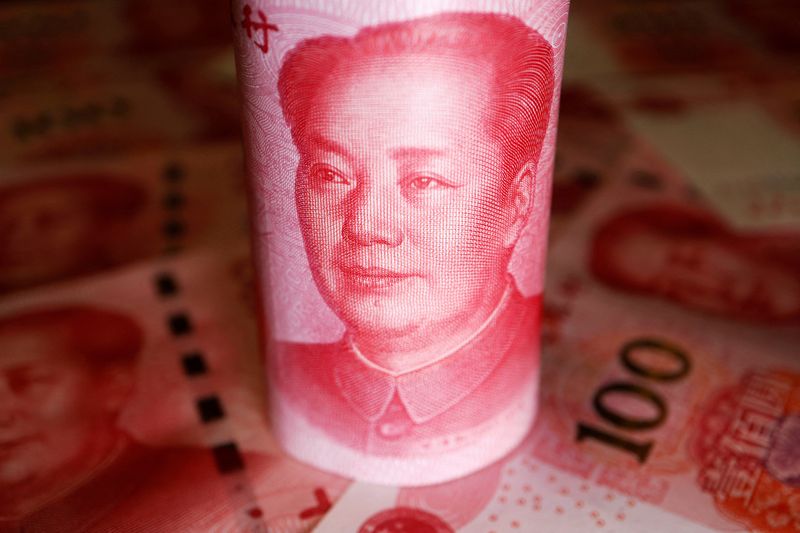
SHANGHAI (Reuters) -China's central bank supplied 14-day cash to its banking system for the first time in months on Monday and at a lower interest rate, signalling its intent to further ease monetary conditions.
The People's Bank of China (PBOC) injected 234.6 billion yuan ($33.29 billion) into the banking system through open market operations, saying it wanted to "keep quarter-end liquidity adequate at a reasonable level in the banking system".
The PBOC added 160.1 billion yuan via 7-day reverse repos at 1.70%, it said in a statement. It also injected 74.5 billion yuan via 14-day reverse repos at 1.85%, compared with 1.95% during the previous injection.
Analysts said the funding operation in itself wasn't a major policy easing. China has typically used 14-day repos to help the banking system tide over long holidays, and the last time it did so was ahead of a spring break in February.
Monday's injection comes ahead of China's National Day holidays starting Oct.1, and the cut in rates aligns the 14-day repo rate with the shorter 7-day repo rate which was cut in July.
"I wouldn’t take this rate cut as a signal that PBOC loosened monetary policy further," said Zhang Zhiwei, chief economist at Pinpoint Asset Management.
"Nonetheless, I do expect PBOC will cut 7 day repo rate as well as the reserve requirement ratio in the coming months. There is a press conference tomorrow when the financial regulators will shed light on their policy stance."
The world's second largest economy is battling deflationary pressures, and struggling to lift growth despite a series of policy measures aimed at spurring domestic spending. Speculation that it will hasten monetary easing perked up last week, after the U.S. Federal Reserve kicked off its easing cycle with a hefty half percentage point rate cut.
The PBOC last cut its short and long-term benchmark lending rates in July.
Faltering Chinese economic activity has prompted global brokerages to scale back their 2024 China growth forecasts to below the government's official target of about 5%.
President Xi Jinping urged authorities to strive to achieve the country's annual economic and social development goals, state media reported earlier this month.
($1 = 7.0474 Chinese yuan renminbi)
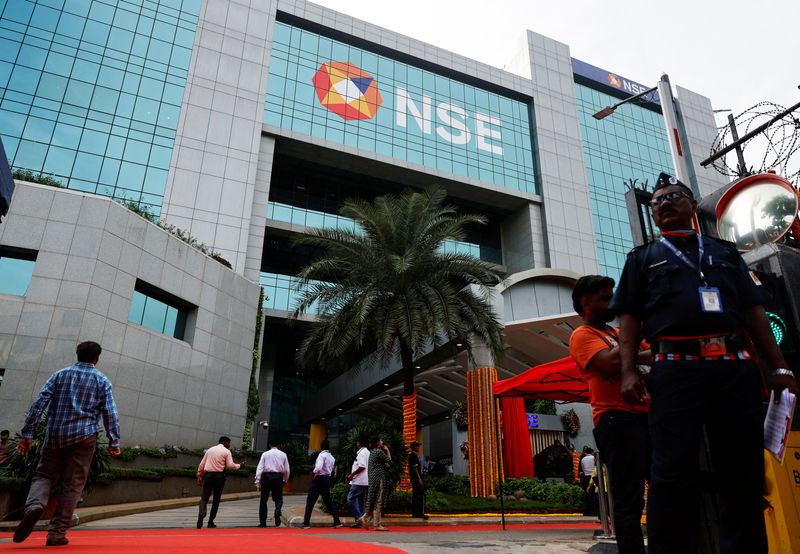
By Bharath Rajeswaran
BENGALURU (Reuters) -India's NSE Nifty 50 and S&P BSE Sensex are trailing only Wall Street's Nasdaq and S&P 500 as top-performing indexes this year, with analysts expecting the rally to extend into 2025.
The Nifty and Sensex have gained 18.7% and 17% respectively in 2024, securing the third and fourth spots among major global bourses.
The Nasdaq and S&P
have added approximately 22% and 20.5%, slightly ahead of the Indian benchmarks. Japan's Nikkei 225 and Germany's DAX follow India, rising 13% and 12%, respectively.
Earlier this week, India's weightage in a key MSCI index topped China for the first time.
"We expect the Fed rate cut to accelerate foreign inflows and create enough momentum in domestic markets to protect against downsides," analysts at Emkay Global said in a note.
India's stock market rally, driven by expectations of policy continuity following national elections in June and a robust growth outlook, gained further momentum after the U.S. Federal Reserve's significant rate cut on Sept. 18.
Foreign portfolio inflows, which had moderated in August, are on course for to hit a six-month high in September.
The rally has pushed the 12-month forward price-to-earnings ratios of the Sensex and Nifty to 23.6 and 24.4, respectively—the highest among emerging markets. Technical indicators show both indexes are now in overbought territory.
Expectations of soft landing for the U.S. economy will also likely boost sectors like information technology and pharma which earn a significant share of their revenue from the U.S., according to analysts.
Realty, autos, public sector enterprises, pharma and energy are among the top performing sectoral indices so far this year.
Domestic institutional and retail investors have also fueled the stock market buying into all dips.
Domestic institutional investors picked up shares worth a net of 3.23 trillion rupees since the start of the year, according to provisional data from National Stock Exchange.
Mutual funds too have remained net buyers since February 2021 with contributions through the systematic investment plan hitting record highs for 14 months in a row.
This has raised some concerns, with analysts at Jefferies saying the combined domestic inflows through mutual funds, direct participation, insurance and pension funds are "unsustainably high" of $7.5 billion per month between January and August.
The brokerage said it maintained a near-term cautious view on markets, small- and mid-caps.

(Reuters) -SpaceX plans to launch about five uncrewed Starship missions to Mars in two years, CEO Elon Musk said on Sunday in a post on social media platform X.
Earlier this month, Musk had said that the first Starships to Mars would launch in two years "when the next Earth-Mars transfer window opens."
The CEO on Sunday said that the first crewed mission timeline will depend upon the success of the uncrewed flights. If the uncrewed missions land safely, crewed missions will be launched in four years. However, in case of challenges, crewed missions will be postponed by another two years, Musk said.
Musk, known for providing changing timelines on Starship's readiness, said earlier this year that the first uncrewed starship to land on Mars would be within five years, with the first people landing on Mars within seven years.
In June, a Starship rocket survived a fiery, hypersonic return from space and achieved a breakthrough landing demonstration in the Indian Ocean, completing a full test mission around the globe on the rocket's fourth try.
Musk is counting on Starship to fulfill his goal of producing a large, multipurpose next-generation spacecraft capable of sending people and cargo to the moon later this decade, and ultimately flying to Mars.
NASA earlier this year delayed Artemis 3 mission and its first crewed moon landing in half a century using SpaceX's Starship, to September 2026. It was previously planned for late 2025, NASA said.
Japanese billionaire Yusaku Maezawa in June canceled a private mission around the moon he had paid for, which was to have used SpaceX's Starship, citing schedule uncertainties in the rocket's development.

